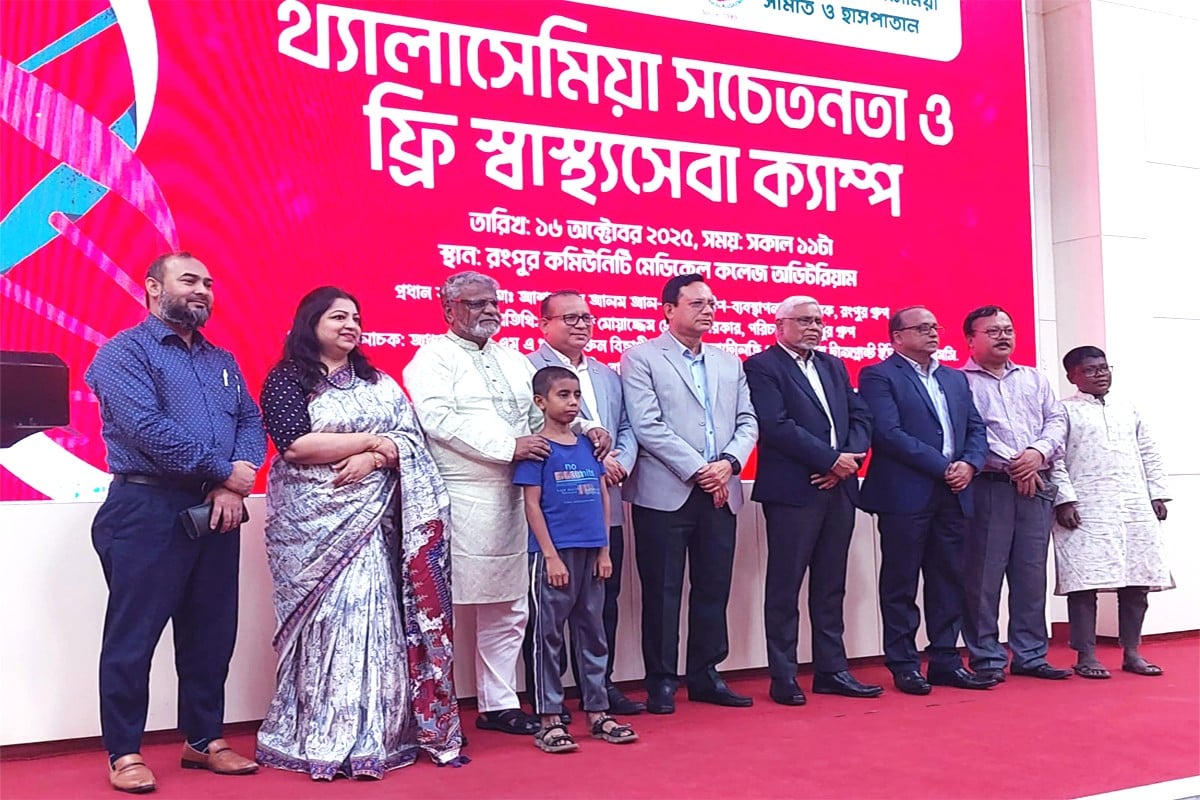News Flash
News Flash

RANGPUR, Oct 16, 2025 (BSS) - Renowned health experts in a discussion today
said that the complex disease of thalassemia can be completely prevented if a
thalassemia gene carrier does not marry another gene carrier.
They laid special emphasis on creating adequate awareness among the general
public about thalassemia and encouraged everyone to get thalassemia blood
tests done before marriage to make Bangladesh free of this disease within the
next 10 years.
With the support of Bangladesh Thalassemia Samity Hospital, Rangpur Community
Medical College and Hospital (RCMCH), an associate institution of Rangpur
Group, organised the discussion titled "Thalassemia Awareness and Free
Medical Campaign" at its auditorium in the city.
Presided over by Rangpur Community Medical College Professor Dr Md Shariful
Islam, 250 participants, including 145 fifth year MBBS students and intern
doctors and teachers of the internationally reputed private sector medical
college attended the event.
Deputy Managing Director of Rangpur Group Md Ashraful Alam Al-Amin addressed
the discussion as the chief guest while Director of Rangpur Group Mohammad
Moazzem Hossain Sarkar spoke as special guest.
Bangladesh Thalassemia Samity Hospital Executive Director Dr AKM Ekramul
Hossain presented a documentary on Thalassemia narrating its present
situation, treatment facilities and way-outs to build a Bangladesh free from
the preventable disease.
"In Bangladesh, 12 percent of the population carries the thalassemia gene,
where the prevalence rate of thalassemia gene carriers in Rangpur is 27
percent and in Dinajpur 17 percent. The situation in Rangpur division is very
bad," he said.
Associate Professor of the Department of Hematology at Dhaka Medical College
Hospital (DMCH) Dr Mafruha Akter gave a scientific presentation on
Thalassemia.
She elaborately discussed the reasons behind the disease caused by a genetic
mutation that causes a defect in hemoglobin production.
"There is no problem if a thalassemia gene carrier and a non-carrier get
married. However, if a thalassemia gene carrier marries another gene carrier,
then the probability of their children becoming thalassemia patients is 25
percent," she said.
Ex-Head of the Department of Hematology and Bone Marrow Transplant at
DMCH Prof Dr M A Khan delivered the keynote presentation narrating the
treatment protocol and other technical and scientific issues related to
thalassemia.
The experts said that thalassemia is a blood disorder and inherited from
parents to children through genes.
The treatment of the disease for a patient is very costly and ranges between
Taka 10,000 and Taka 20,000 or even much more per month.
Prof Khan said thalassemia is treated based on its severity, with common
treatments including regular blood transfusions for moderate to severe cases
and iron chelation therapy to remove excess iron buildup from the
transfusions.
"Other treatments may involve folic acid supplements, medication like
luspatercept or hydroxyurea, and in rare, severe cases, a stem cell (bone
marrow) transplant to cure the condition," he said.
He especially called on the media workers to disseminate adequate information
to make the public aware of the completely preventable disease and popularize
blood tests before marriage for everyone to free Bangladesh from thalassemia.
Chief guest Ashraful Alam Al-Amin said that the RCMCH authorities will make
every effort to increase awareness of thalassemia and make treatment easily
available to thalassemia patients at affordable prices.
On the occasion, Chief Medical Officer of the Bangladesh Thalassemia Samity
Hospital Dr Kabirul Islam and experts physicians of RCMCH provided cost-free
treatment and medicines worth about Taka one-lakh to 40 thalassemia patients.